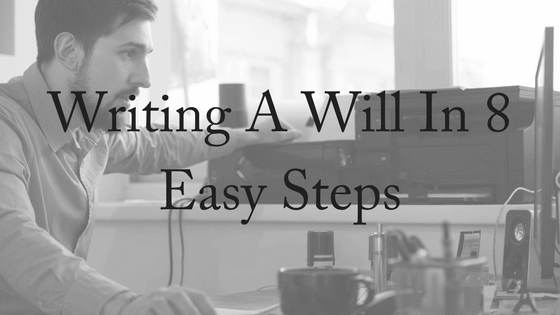Let’s look at the steps to writing a will. The hardest part of writing a will is often finding the will to write it. After all, it’s a document you hope won’t be used for a long time – plus, it makes you think of your own death. By writing a will, you’re acknowledging that you may not be immortal. Add in the many other activities that are more fun than writing a will, like going to the beach or hanging out with friends and family, and you have a surefire recipe for procrastination.
If you’ve been putting off the task, here’s your chance to cross it off your list. Get started now, and get started on writing a will in eight relatively easy steps.
Writing A Will In Eight Easy Steps
 1. Lawyer, online software or do it yourself? Because there are so many opportunities to make mistakes, don’t opt for a DIY will. One of the best examples arguably lies with the late Warren Burger. You’d think a Supreme Court justice would have no problem writing his own will, but he made an array of errors that cost his heirs plenty in legal fees and more than $450,000 in taxes. No matter how little you think you’ve got, or how much you think you know, always seek legal advice. It’s a complex area of the law and any mistake can cause conflict and expense for those you leave behind.
1. Lawyer, online software or do it yourself? Because there are so many opportunities to make mistakes, don’t opt for a DIY will. One of the best examples arguably lies with the late Warren Burger. You’d think a Supreme Court justice would have no problem writing his own will, but he made an array of errors that cost his heirs plenty in legal fees and more than $450,000 in taxes. No matter how little you think you’ve got, or how much you think you know, always seek legal advice. It’s a complex area of the law and any mistake can cause conflict and expense for those you leave behind.
2. Select your beneficiaries. When you die, someone is going to get your money, your house, your car, your jewellery, your furniture and everything else you own. You probably won’t have to think long about beneficiaries, unless your family structure is complicated. As you go through life, your family is likely to get more complicated: marriage, children, divorce, step-children, grandchildren, nieces, nephews and more are likely to come along. That’s why you should get to writing a will every five years or so.
Also explain in the will why someone isn’t receiving money, if you decide that one child will get more, for example. If you’ve given one child a lot of financial assistance as an adult and the other virtually none, you may want to leave the bulk of your assets to the one you didn’t help. Explaining that could assuage hard feelings after you’re gone.
 6. Other people need to sign the will. In Queensland, to be a valid will, it must be: in writing, signed by the will maker, and witnessed by two people. When wills are signed incorrectly, they can become invalid. That’s when an estate battle can erupt.
6. Other people need to sign the will. In Queensland, to be a valid will, it must be: in writing, signed by the will maker, and witnessed by two people. When wills are signed incorrectly, they can become invalid. That’s when an estate battle can erupt.
7. Find a place for your will. Don’t just throw it in a shoe box and forget about it. What if the unthinkable happens and your heirs need it? Make sure someone you trust knows where to find your will as well as any other important papers and passwords to financial institutions like banks. And it’s probably a good idea to store the original copy somewhere secure, like in a fireproof safe.
8. Now that you’re done, you aren’t done. Assuming this is still an unfinished part of your agenda, you should work on a power of attorney and an advance health directive in case you’re ever incapacitated. You should also think about updating your will every four or five years, because your circumstances are likely to change.

